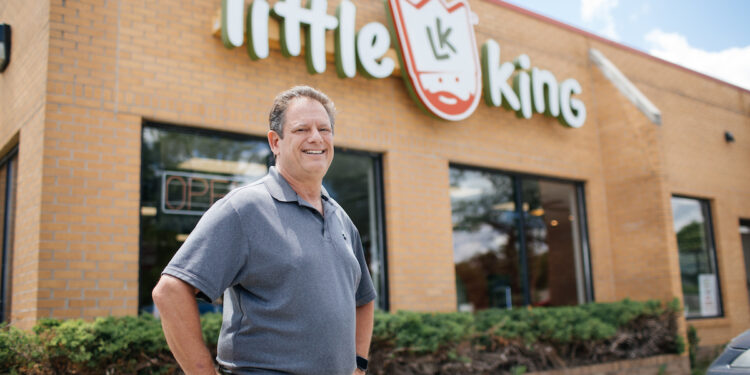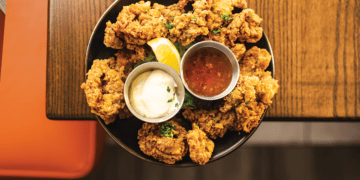Loyalty is something for which many businesses strive. It happens when a business is wrapped around the DNA of a city, and that city is tied right back, entwined all the way into those dioxy ribonucleics so many businessowners chase but don’t catch.
br
That’s when a business acquires customers they know by name—if not the one on their birth certificates, then at least the one from their sandwich orders—and clients who pull a company’s moniker from memory as easily as that of a family friend.
br
At least one local company has created this type of loyalty. It has been operating in locales between the state lines since the capitol building was a gilded glimmer in architect Bertram Grosvenor Goodhue’s eye.
br
That company is Lawlor’s Custom Sportswear shop, operating in Nebraska since 1896 and still cranking out licensed local apparel after innumerable shifts in their plans and changes to the sports world.
br
Lawlor’s story mirrors that of the previously alluded-to Little King Deli and Subs, the sandwich shops that have endured since around the time the Nixon administration took office.
br
To follow these two local staples is to climb aboard the inevitable roller coaster of small business ownership with all the carnival-ride loops and banked turns that follow.
br
Pat Lawlor and his family can unfurl his business’ history in front of a customer like a particularly long receipt from the store.
br
“Lawlor’s in 1896 was run by my great-grandfather Nicholas, and focused on bicycles, and then added motorcycles as they became more popular,” he said.
br
“In the 1920s, more and more people were driving cars and motorcycle use dropped,” Lawlor continued. “After World War I and World War II, Lawlor’s became a full-line department store in addition to sporting-goods [store] as people wanted about anything you could sell. We sold hardware, tools, guns, record players, toys, appliances, yard equipment, bikes, and even paint.”
br
Throughout its history, Lawlor’s continued to shift to meet the ebbing and flowing of the local tide, showing a Darwinian knack for evolution.
br
“As larger national department stores emerged in the 1970s we went back to our roots and sold just sporting goods,” Lawlor said.
br
This idea, this malleability in purpose and in keeping one eye on the macro view, has helped Little King thrive, according to one-time owner and current Little King franchisee Bob Wertheim. Wertheim’s father opened the first Little King around 80th and Dodge streets in 1969.
br
Embracing modern changes such as an increased social media presence are things that Wertheim couldn’t have known would be. “We’re big into Facebook, it’s a great way to connect to our customers. To make sure they knew we were open during the past year, in particular.”
br
During the four decades of meats, cheeses, and freshly baked bread, Wertheim has seen the store go national—ballooning at one point to a company with stores on both coasts—but he has always felt the local connection to be what’s made them so successful.
br
There are certain things that are tried and true; foundational tenets that are etched into the bones of the company that both Lawlor’s and Little King embraced.
br
“Relationships matter for us,” Wertheim said. “Caring about people hasn’t changed (since 1969). That’s still the same.”
br
“The sole reason for my success is that I had the examples of customer service and being nice to my employees from my grandfather and dad,” Lawlor said. “They never made a big deal of it, they just fleshed it out every day. Literally the only reason I have been successful is because of their example and influence.”
br
Lawlor and Wertheim have both been around their respective companies for decades and, as such, have seen any manner of changes, fluctuations, and trends come and go.
br
“There have absolutely been some periods of rebirth. Some ups and downs,” said Wertheim, who recently oversaw the sale of the franchise system to Chip James of Lockwood Development. “Like any small business, we have had our fair share of ‘gain two stores, lose one.’”
br
Lawlor and Wertheim spent large portions of their youth tagging along with their business-minded parents, but they took different paths to get where they are today.
br
After Lawlors’ short stint as a youth minister, a job that he credits for a lot of his managerial success, he found himself in charge of the one-time black sheep of the company: the screen printing division.
br
This section of Lawlor’s was regarded at the time as an unwinnable, costly failure. Lawlor’s recollects this as “The company loser.”
br
But, the man who had been heat-pressing Nebraska logos on shirts since fourth grade was determined to see what he could make of it.
br
Eventually, he was able to turn that division around and also help keep all of Lawlor’s afloat, after the sporting-goods stores tied to the family business closed in August 2000.
br
Wertheim shares a similar philosophy, priding the people of Little King with their resiliency and consistency in keeping the key pieces of the company front and center. “We have persevered. What we have are problem solvers, not
brproblem seekers.”
br
Lawlor’s, forever connected to the local sports scene, plan to continue cranking out merchandise for the Huskers, Jays, Lancers, and more by scaling up their operations this year.
br
Wortheim and Little King will be following the new direction of Chip James while still maintaining the elements that enabled them to grow from that small little deli store to a company synonymous with quality in the Omaha area and beyond.
br
Visit Lawlor’s and Little King for more information.
This article originally appeared in the August/September issue of B2B Magazine. To receive the magazine, click here to subscribe.













